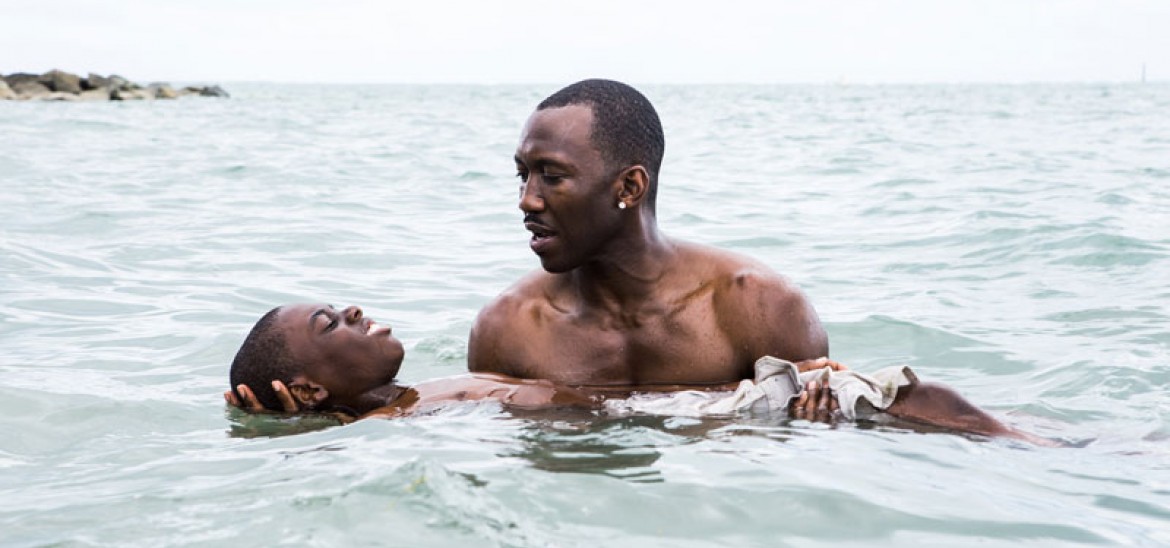Into Film Clubs
Find out everything you need to know about starting an Into Film Club.



Moonlight tells the story of a young Black man named Chiron struggling to find his place in the world, as he journeys from childhood to adulthood in an impoverished area of Miami, Florida. The film uses three actors to drop in on Chiron's life at different ages, his journey taking in issues around masculinity; race; sexuality; identity; family and love. This immensely moving drama speaks to wider cultural issues, but also demonstrates how powerful personal moments in our lives come to shape who we are.
The film has its origins in an un-produced play called In Moonlight Black Boys Look Blue by Tarell Alvin McCraney. Drawing heavily on his own experiences, McCraney's story fell into the hands of director Barry Jenkins, who was drawn to the tale partly because of its parallels with his own life. Coincidentally, Jenkins and McCraney grew up in the same Florida neighbourhood - Liberty City, where the film takes place - attending the same schools, albeit at different times. As well as this, each went on to pursue an artistic career dealing with themes relating to their own upbringings, not least their shared experience of growing up with single mothers struggling with drug addiction. As such, the two men immediately felt like kindred spirits.
The opening chapter features Chiron aged 10. Badly bullied, 'Little' (as he is nicknamed) meets and befriends Juan, a local dealer who becomes a surrogate father, even as he is quietly supplying Little's mother with drugs. Lonely and withdrawn, Little rarely speaks or makes eye contact, but finds a certain safety net in hanging out with Juan and his girlfriend Teresa, forming a bond that he will carry forward into adulthood. Too young to understand certain language, he is the target of homophobic bullying, as the surrounding community places him into categories before he even understands what that means.
We encounter Chiron again at two other stages of his life. In high-school, aged 16, he is still being picked on, faces an increasingly difficult relationship with his mother, and remains socially awkward. One connection he does form is with classmate Kevin, who appears much more confident and outgoing, fitting in as Chiron remains marginalised.
The story then picks up around ten years later, with some startling transformations in Chiron (now known as 'Black', a nickname given to him by Kevin in school), adopting the broad, hyper-masculine physical appearance of Juan, and working on the streets. As he tentatively reconnects with somebody important to him, what follows is an emotionally raw portrait of a person gradually learning to express themselves and articulate who they are.
Although the three actors do not have a strong physical resemblance, they are connected by an ability to capture the same inner feelings, even though they never met during filming. Many films convey the passing of time by ageing an actor - or in the case of Boyhood, by filming the same actor over a long period of time - but Moonlight's approach is slightly different, relying on finding three individuals capable of showcasing the same complexity at various stages of the character's maturity.
One individual who appears throughout is Chiron's mother Paula, played by Into Film ambassador Naomie Harris. Taking what could have been a clichéd, reductive character and turning her into a complex, troubled, but loving woman, Harris' performance is a remarkable transformation, producing tremendous empathy for an individual who might be treated as monstrous in many less sensitive films. Astonishingly, Harris filmed her role in just three days, in between duties for the glitzy press tour of Spectre.
Miami's intoxicating architecture, heat, light, and colour is hugely evocative, but Chiron's world is a long way from other cinematic representations of the city, like Miami Vice. The city also tells us something about Chrion's isolation. The exuberant gay Miami seen in a film like The Birdcage is unlikely to register with Chiron; his is a closed and claustrophobic space that is very difficult to escape from. However, there is also a sense of community for the characters and the spaces they navigate, and the narrow focus immerses the audience in the world of the film.
This complex vibrancy is captured in the cinematography of James Laxton. The camera captures a series of haunting, ethereal close ups of the central characters, while at other times we are seemingly following Chiron at a discreet distance as he navigates the neighbourhood. We are with Chiron to such an extent that he even seems to be looking directly at us at times, communicating to the audience what he feels unable to say to those around him.
Watch out for the recurring motif of Chiron's backpack, often held close to him as if using it to shield himself from other people. This sense of trying to protect himself extends to his appearance in the final chapter. Black uses his clothes and bulky physique as armour to convey a particular image to the world, as he's frightened of letting people know who he really is. Heartbreaking within the context of the film, it also serves as a wider challenge to the stereotypical images of Black masculinity that are often seen in popular culture.
Moonlight uses a restrained, haunting musical score to add to our understanding of the characters and their emotional complexities. Using a process called 'Chopped and Screwed', where tunes are sampled and audio is bent and shifted around, the music changes with Chiron's development, but retains a strange, distinctive theme that runs throughout.
This is a story about love, friendship, being an outsider, and realising who you are. There is an understanding that all of us wear masks to some extent to convey a particular image of ourselves, but that this can be particularly pronounced for anybody growing up feeling different, or isolated. It is also a story of somebody learning to communicate and gradually developing the courage to pursue what they want. As such, it is a vital, compassionate film with poignant lessons for all young people learning to find their own place in the world.
Listen to our interviews with the stars of the film.
Visit our soundcloud channel for more filmmaker interviews. Also on itunes.
Viewing 4 of 4 related items.

Get in touch with your article ideas for the News and Views section.